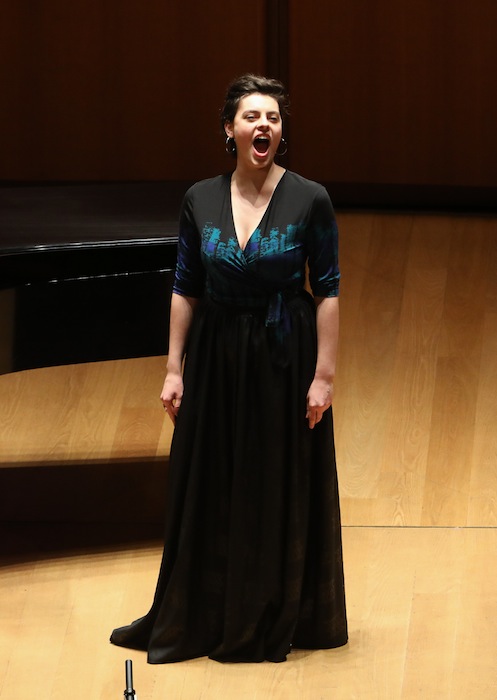Mezzos to the max at the George London Foundation Finals

Emily D’Angelo performed at the George London Foundation Competition Finals Concert Friday afternoon at the Morgan LIbrary. Photo: Mark Von Holden
Throughout the season at the Morgan Library, audiences get to hear fine recital performances by recipients of awardees from the George London Foundation for Singers, an organization dedicated to advancing the careers of promising opera singers. Friday afternoon offered a chance to see a part of the Foundation’s work up-close, as the next class of London Award recipients was chosen at the finals of the Foundation’s annual competition.
There was a lot of predictable competition rep on the program, but one also got to hear a few bold surprises, as well. On the more standard end of things, there was a lot of Gounod–two performances, in fact, of Marguerite’s “Jewel Song” from Faust, thankfully in two noticeably different interpretations. Anna Dugan’s rendition was notable for the astonishing fullness of her sound, a luscious richness that filled the stage, making one wonder whether she’d have been better served by picking something heavier. Lauren Margison, who took home one of the six top prizes, was more rooted in her excellent connection to the text, showing gorgeous French diction and a sparkling sound that evinced a childlike excitement entirely fitting for the aria.
Deanna Breiwick gave an enchanting take on “Je veux vivre,” the great soprano aria from Roméo et Juliette. The rich color of her middle voice lived luxuriantly in the big French vowels, and she brought a certain sensuousness to the sighing phrases that made her interpretation stand out. The last Gounod selection came from mezzo-soprano Raehann Bryce-Davis, who earned one of the top prizes for “O ma lyre immortelle” from Sapho. She combined a smoldering cushion of a voice with a keen sense of drama in her approach to the music. The force of her top was bracing, especially impressive as she held the final note for ages without coming close to giving way.
It turned out to be a great day for mezzos: two others in addition to Bryce-Davis were awarded top prizes. Rihab Chaieb gave a captivating performance of “Oui, Dieu le veut” from Tchaikovsky’s Jeanne d’Arc, showing an instrument of light color and giving a deeply committed portrayal of her character. Friday’s youngest competitor, twenty-three-year-old Emily D’Angelo, was also among the most impressive, with a sublime rendition of Rosina’s “Una voce poco fa” from Barbiere di Siviglia, fitting her smoky mezzo-soprano over the contours of the aria like an impeccably tailored glove. Her ornamentation was just right and her voice cascaded beautifully over it. Add a blazing top, clear, Italianate singing, and a wonderfully cheeky cabaletta, and you had the most promising performer of the day.
Mezzo-soprano Sarah Coit showed a firm coloratura in her energetic account of “Agitato da fiere tempeste” from Handel’s Riccardo Primo. Jana McIntyre’s vibrato was a touch wide to complement her hard soprano in “Qui la voce,” the mad scene from I Puritani, but she was more successful in the cabaletta, showing off the dexterity of her middle voice and eliciting a delighted “ooh!” from the back of the hall with one searing high note.
Tenor Aaron Short showed off a big, brassy sound with expansive top notes and a keen sense of text and phrase in “Dein ist mein ganzes Herz” from Lehár’s Das Land des Lächelns. Martin Bakari displayed a confident approach and pliant tenor in “Un’aura amorosa” from Così fan tutte. Corrie Stallings showed a fine, warm mezzo and subtle emotion, though “Must the winter come so soon” from Barber’s Vanessa was a fairly staid selection. Madison Leonard’s dark, pulsing soprano revealed chirping brightness at the top in her brilliantly comic rendition of “Glitter and be gay” from Candide.
The two bravest selections on Friday’s program didn’t take top prizes, alas, but both received excellent performances. Amy Owens gave a steely, pinpoint-accurate rendition of “I am the wife of Mao Tse Tung,” the celebrated soprano aria from John Adams’s Nixon in China. Countertenor Daniel Moody’s account of “Dawn, still darkness” from Jonathan Dove’s Flight was one of the highlights of the afternoon, showing a reflective, clear sound at his top but a richly colored lower register, as well. He captivated with his clear intention in this dramatic aria, bringing striking intensity to the haunting melodic lines.
As it was for the mezzos, Friday was fruitful for the two lowest voices, both of whom earned top honors. Ben Taylor showed off an immensely powerful baritone, but also impressed with his lyric sense in a passionate reading of Yeletsky’s aria from Tchaikovsky’s Pique Dame. Lawson Anderson sang “Abendlich strahlt der Sonne Auge,” Wotan’s monologue as he leads the gods into Valhalla in Das Rheingold. His voice is like granite, perfectly firm, but with a richly veined tone.
Craig Rutenberg is a regular accompanist in the London recitals at the Morgan, and he’s done some exquisite playing in that capacity. For Friday’s finals, unfortunately, it was clear that he had a lot on his plate, and so some of his work was fairly cursory. The best of it was in Strauss, accompanying Samantha Gossard’s mature, almost lied-like performance of “Wie du warst!” from Der Rosenkavalier.
You would think one might get tired of an afternoon of opera arias, but Friday’s final was a delightful two hours. It’s a fitting complement to the superb recitals the London Foundation presents throughout the year.






